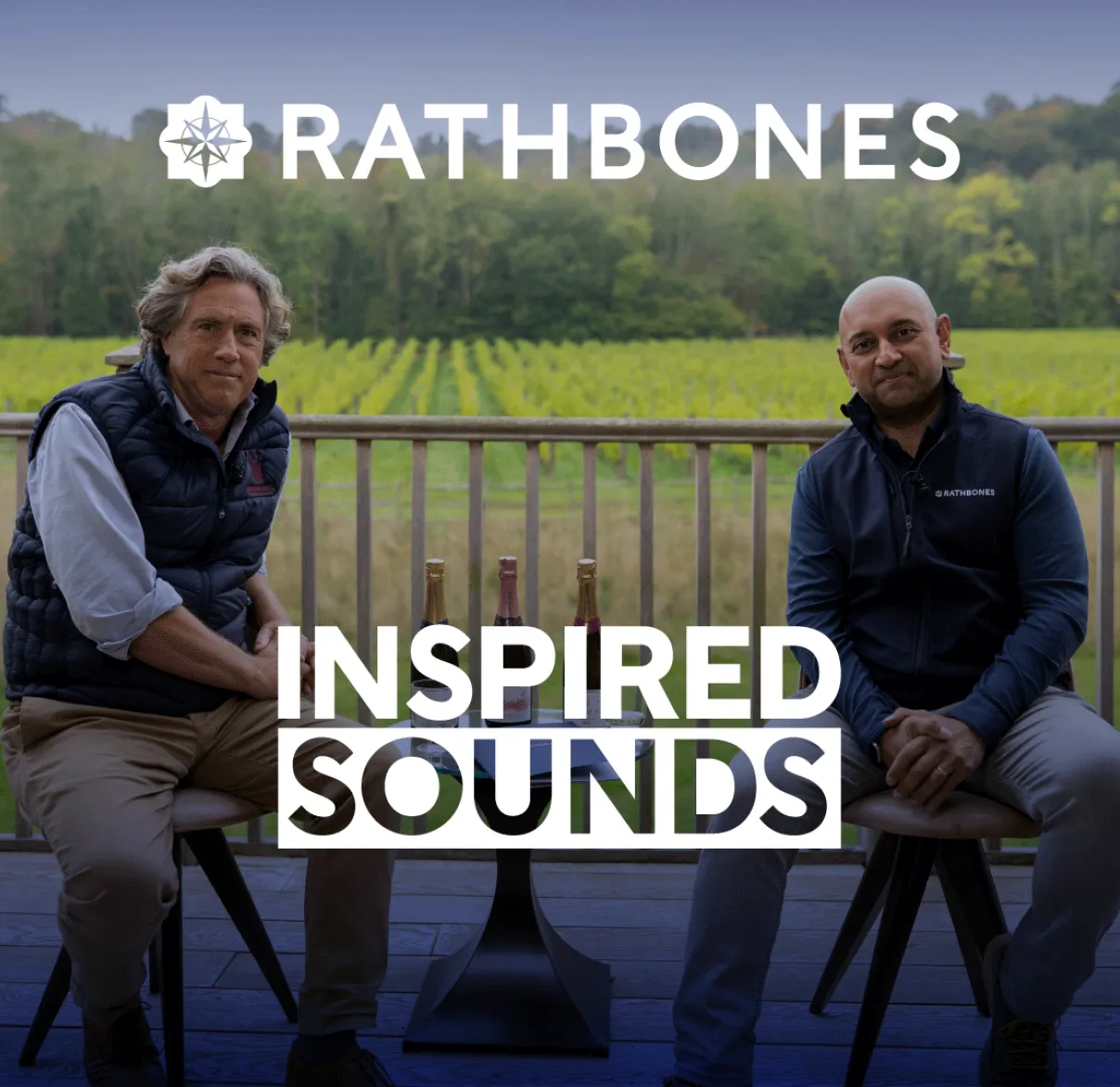Kartik Raal:
Hello and welcome to Inspired Sounds, Rathbones’ exclusive podcast dedicated to supporting and empowering entrepreneurs. In each episode, we dive into the journey of inspirational entrepreneurs and founders who share the thrills and spills of their own journey. We hope you enjoy listening.
I’m Kartik Raal, Investment Manager at Rathbones. Welcome to another episode of Inspired Sounds. We’re here on location at Hundred Hills Vineyard in Oxfordshire. We’re going to meet the founder, Stephen Duckett. Let’s go inside.
Stephen, thank you first of all for hosting us on site, which is our first ever onsite podcast. It’s brilliant. I appreciate it, and I’m sure the listeners and viewers will appreciate it as well. Tell me a little bit about what’s been going on over the last few weeks because I think it’s been a busy time.
Stephen Duckett:
It has been a busy time. Every year at Hundred Hills, every vintage is different, and this year is no exception. For the first time, we harvested our grapes in September — it’s normally mid-October or even late October. So, really a lot earlier, thanks to a very warm, hot summer.
The vines burst their buds early, flowered early, and ripened sooner than we’ve seen before. But they are beautiful grapes. At Hundred Hills, we have ten very different parcels of high-quality Pinot Noir and Chardonnay. We expect every year that some parcels will develop differently, and that’s part of the plan. This year, every parcel produced very distinctive grapes.
For the last three weeks, we’ve been harvesting those grapes by hand, slowly and steadily bringing them in as they became fully sugar ripe. They have great phenolics, complex flavors and aromas, and the acidity is in a good place for the vibrant sparkling wines we’re known for.
After a couple of very hard weeks — 7:00 a.m. starts, midnight finishes — we’ve got everything into the winery, which is always a good feeling.
Kartik Raal:
Are you hands-on as well?
Stephen Duckett:
I am very hands-on at this time of year in the winery. I have a team who are very experienced at picking and bringing grapes in from the vineyards. In the winery, the biggest impact I can have is making sure pressing is done quickly, precisely, and exactly as I want it.
Our pressing is a little different from much of the sparkling world. We bunch press whole bunches, splitting the skins and taking juices from the center. We press four tons of grapes at a time, and we really care about quality.
The biggest thing by far is all in the vineyard — wines are made in vineyards, not wineries. In wineries, you aim for minimal intervention and preserve the quality from the vineyard. That starts at pressing: quickly and precisely.
We also monitor sugars, acids, and potassium in real time. This helps us decide where to cut off the press to maximize juice quality. We run algorithms to adjust presses and manage the process, which makes a big difference to quality.
The rest of the year, I spend all my time out in the vineyards. That’s where the complexity is. Grapes synthesize an extraordinary array of aroma and flavor molecules, and you want them healthy when they come into the winery. Out there, it’s all science; in here, it’s science and art.
Kartik Raal:
You clearly have an intense passion for this. Tell me about the journey that brought you here, and a bit of family background.
Stephen Duckett:
I grew up on farms in Somerset. My family had been farming for about a thousand years. I’m very comfortable in a farming community.
Later, I turned out to be handy with computers, which was useful. After studying engineering and economics management at Oxford, I spent 25 years in my first career — starting young software businesses, then internet businesses, and eventually working with big companies.
I loved it, but it wasn’t going to go on forever. My wife Fiona and I talked about doing something together, and for me, that always felt like it might have a farming root. Fiona was delighted that root was wine!
We stumbled on the idea after tasting an English sparkling wine blind against Champagne in 2000. It was excellent, and that got me thinking. Over time, I realized the climate had changed — Oxford University studies showed growing season temperatures were 2°C warmer than in the 1970s. That’s huge for wine.
So, we searched for the best land in England to make world-class sparkling wines. In 2009, we met Dr. Michel Salgues, who had made Cristal for Roederer and established Roederer Estate in California. He became my mentor, and we spent years learning and planning.
We looked at over a hundred sites before finding this one. The soils here are identical to Champagne’s chalk soils, and the climate is now similar to Champagne in the 1990s and 2000s. That gave us confidence.
Kartik Raal:
What were the biggest risks?
Stephen Duckett:
The biggest commercial risk was building the winery—a large, complex project costing millions. I spent 18 months focused on making sure it stayed on track.
Other risks were about building high-quality teams. I’m very hands-on and committed to continuous improvement, so I need people who share that mindset.
And then there’s momentum. Starting with a green field and telling people you’ll make world-class wines is bold. You need to show the path from A to B — what I call eating the elephant one sandwich at a time.
Kartik Raal:
You mentioned Fiona. How do you manage business life and personal life?
Stephen Duckett:
Fiona and I have been together since we were teenagers at Oxford. She’s very good at assessing and managing risk, making sure everything is legally and operationally sound. We work together extremely well, and she’s involved day-to-day.
Kartik Raal:
Let’s talk about the vineyards.
Stephen Duckett:
We’re high up in the Stonor Valley in Oxfordshire, on steep chalk slopes. Vines need to struggle to produce great fruit, and they do here. The topography protects against frost and disease, and the dry autumns help keep grapes healthy.
We chose this site after detailed soil analysis and advice from experts. It’s all about detail—orientation, slopes, rootstocks, everything. And then, a lot of hard work by hand.
Kartik Raal:
If climate change continues, could you make still wines?
Stephen Duckett:
Yes. If average temperatures rise by another degree, we could make world-class still wines here. This year, for the first time, it might have been possible. For now, we focus on sparkling, but the future may include still wines.
Kartik Raal:
What are your top tips for entrepreneurs starting out?
Stephen Duckett:
Understand where you have advantages. Mitigate risks. Make sure you have the finance to stay the course.
Commit to continuous improvement — personal, professional, and as a team. You won’t be the best out of the blocks, but if you learn aggressively year after year, you can get there.
Resilience is critical. You will face setbacks. Things are never quite as good or bad as they seem, but you need to work through challenges.
Kartik Raal:
If you could do one thing differently?
Stephen Duckett:
I’d have gone international sooner. We’re now seeing great success in Japan, the U.S., and Europe, but I could have started earlier.
Kartik Raal:
Biggest sacrifice?
Stephen Duckett:
Time with family. Entrepreneurship is intense. I’ve managed it partly because Fiona, and now two of our daughters, are involved in the business, which is a privilege.
Kartik Raal:
What does wealth mean to you?
Stephen Duckett:
Two things: insurance against life’s ups and downs, and freedom to choose how to live your life. For me, wealth allowed me to create something special here.
Kartik Raal:
Stephen, thank you very much.
Stephen Duckett:
You’re very welcome. It’s been lovely chatting.
Kartik Raal:
Thank you for listening to this episode of Inspired Sounds. We hope you enjoyed it and will join us again for future episodes.





